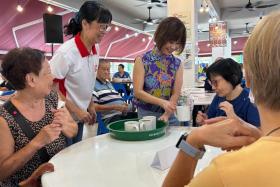More seniors aged 65 and older to get help to combat frailty
A programme to prevent the onset of frailty in seniors aged 65 and older, reverse its progression, and even improve seniors’ long-term health outcomes will be extended to all National Healthcare Group (NHG) polyclinics in the central region by end-2025, the group announced on Oct 24.
The programme focuses on three key parts – frailty intervention, referral to community exercise programmes, and the tapering off or stopping of medication.
In the pilot of the Frailty Programme launched in 2022, more than 7,100 patients from NHG polyclinics were screened, and 3,600 of them received interventions to prevent the onset of frailty or reverse the process.
Through the collaborative efforts of the multidisciplinary team – which included doctors, care coordinators and clinical pharmacists – NHG polyclinics successfully improved frailty outcomes of the 3,600 patients, said Dr David Ng, deputy director of clinical services at NHG polyclinics and lead of the group’s Frailty Programme.
These patients seen at the polyclinics in Toa Payoh, Hougang and Ang Mo Kio were found either to be managing well or living with very mild frailty.
“The good news was, at the 12-month follow-up after intervention programmes, almost half (48 per cent) of the patients who were managing well and about three in 10 (31 per cent) of those with mild frailty showed improved hand grip strength of 1kg or more,” added Dr Ng.
Patients who are said to be managing well are those who have their medical issues well under control, but beyond walking routinely, they are often not regularly active. Those living with mild frailty are limited in their activities, such as walking slower than usual, suffering weight loss and being more tired than usual.
Dr Ng said: “Both groups consist of independent individuals who are physically inactive or showing early signs of frailty such as slow gait. As they age, their mobility declines, significantly impacting their ability to perform daily activities.”
Hand grip strength is a measure relevant to the ageing population, he said.
“It is convenient in a small clinic space where gait would not be suitable as a gauge. The hand grip strength also helped kick-start a conversation on frailty intervention,” Dr Ng added.
The teams at the three polyclinics used the patients’ hand grip strength to assess muscle function and overall physical capability.
Frailty is a medical condition of reduced function and health in older individuals. Factors such as inactivity, poor nutrition, social isolation and multiple medications can contribute to frailty.
Frailty among older people within the community is expected to grow markedly, from 5 per cent to 6 per cent now to 27 per cent in 2030 as Singapore’s population ages.
According to the 2023 National Frailty Strategy Policy Report, as the number of seniors aged 65 years and older increases from 510,000 in 2017 to over 900,000 in 2030, the prevalence of frailty in Singapore is likely to go up as well.
Local studies found that at least 30 per cent of the senior population here were considered pre-frail (between robust and frail), while 5 per cent were frail. Frailty is more common in women.
“Patients want to stay healthy, so we want to encourage them to do so in terms of activities and through diets. First and foremost, we want to educate seniors on food myths, such as on red meats and hypertension... we would like to tell them that the intake of meats can help them build muscles,” Dr Ng said.
An earlier 10-year longitudinal study by Tan Tock Seng Hospital’s (TTSH) Institute of Geriatrics and Active Ageing found that sarcopenia, or the loss of muscle and strength in people as they age, is a challenge for the healthcare system here.
Tracking 300 people since 2013, the study also found the prevalence of this condition among the elderly in Singapore ranged from 13 per cent to 25 per cent.
This was compared with 5.5 per cent to 25.7 per cent for Asia as a whole.
Muscle-wasting contributes to frailty, affecting balance, mobility and a senior person’s overall ability to perform daily tasks.
Retired secretary Doris Yam, 75, was among the seniors who received intervention in the pilot programme.
“I used to play squash and I loved cycling, but as I got on in age, I slowed down,” she said, adding that she had undergone double total knee replacement.
Having been categorised as living with very mild frailty, Ms Yam said she preferred to remain fit. Under the advice of the team managing her health, she signed on for programmes using the Healthy 365 app to achieve her health goals.
“I do Zumba and low-impact aerobics. I found that if I go out to exercise, I make friends and they keep me healthy and young. This way, I managed to reverse my frailty score,” said Ms Yam, who added that diabetes was her main problem.
To prove that she is fit, Ms Yam will be going to Morocco with a few friends in November.
“I was told it would be challenging, and I am up for a good challenge,” she added.
Get The New Paper on your phone with the free TNP app. Download from the Apple App Store or Google Play Store now

